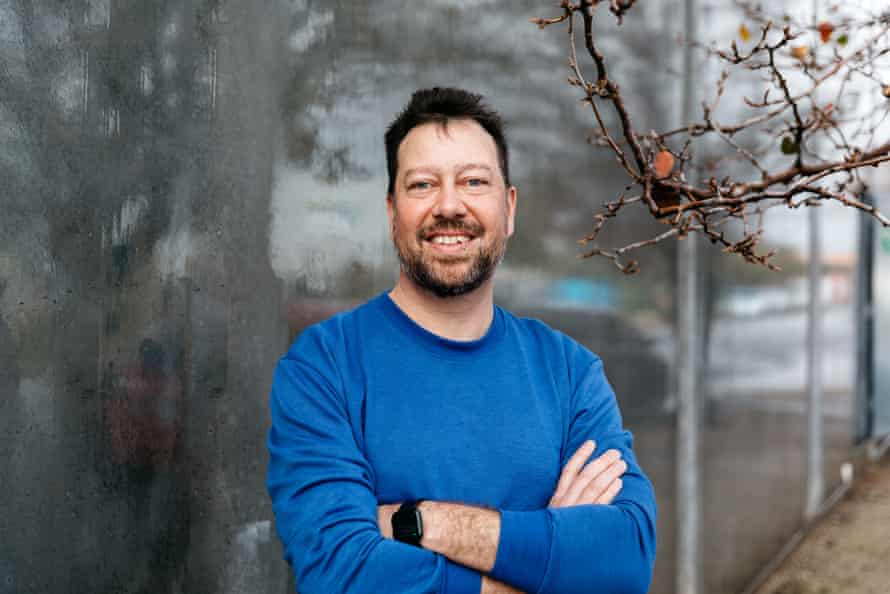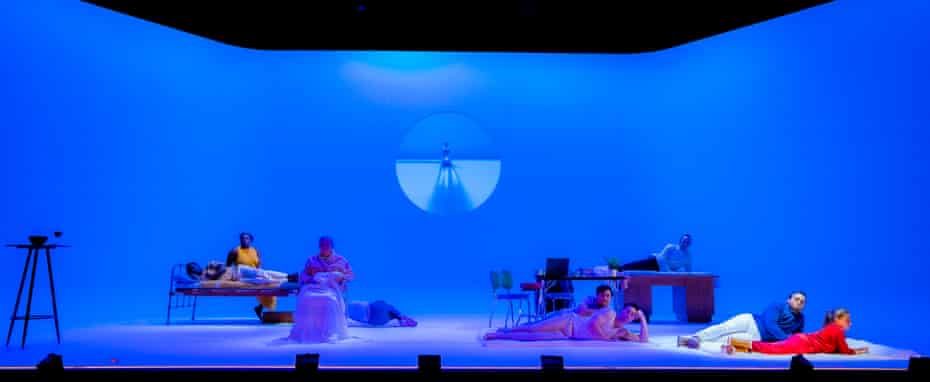The ultimate shutdown: what if we could avoid climate crisis by sleeping for a year?
When playwright Finegan Kruckemeyer imagined a worldwide circuit breaker for the climate in 2019, he wasn’t expecting it to hit so close to home

In the opening scenes of Hibernation, a minister from Australia’s ruling conservative party updates the parliament of 2030 on the unfolding climate crisis. Regional Australia is riddled with ghost towns, whole nations are underwater, and there’s a flood of climate refugees lapping at our still-shut borders. “Everybody is the victim of what is happening to our planet,” spits the unsubtly named Warwick Joyce (Mark Saturno), “and everybody is the culprit”.
His answer? A miracle sleeping agent first developed for the colonisation of space that can plunge human beings into a deep, perfect slumber. But rather than using the gaseous drug to aid an exodus from our doomed planet, Joyce says, why not force the entire human race to sleep – to collectively take our foot off the gas – for one year?
This Earth-Hour-on-steroids premise, now a mainstage play with the State Theatre Company of South Australia opening this week, came to award-winning playwright Finegan Kruckemeyer in November 2019, back when the idea of governments around the world telling their citizens to bunker down at home to stave off a global threat seemed a novel premise for Black Mirror-inspired sci-fi rather than a real-life possibility.
“I’m the father of a six year old, and I’ve been thinking about the world that he’ll inherit and the things that we’ve done and the people before us have done, and what imposition leaves for him and his mates and whatever his world becomes,” Kruckemeyer says of the climate “tipping point” that inspired the play. “I was mulling over all these things in my head – and the stakes felt high.”
The play’s vision of a world without us became less hypothetical early in the pandemic, when humanity’s slowdown prompted various signs of resurgent life – from goats overrunning a Welsh village to a kangaroo hopping through Adelaide’s deserted CBD – with many of these images rippling across the internet and inspiring countless “nature is healing, we are the virus” memes. Many stories, like the dolphins of Venice, were quickly debunked, but it’s easy to see why the thought was tempting – that humankind might still be capable of turning the ship with one great act.

“One thing Mitchell [Butel, State Theatre Company artistic director] as director and dramaturg said to me is ‘do you notice the world is dramaturg-ing you?’ It’s given me all these little clues about the story I should be telling,” he says. His script contains a few obvious nods to the Covid era (one character describes hibernation as “the most not-going-anywhere year of our lives”).
Covid-19 might have shown how governments and communities are capable of accepting once-unthinkable measures to curtail disaster, but it’s also illustrated how such responses can further tip the scales rather than balance them. Spread across a decade and five continents, Kruckemeyer attempts to marry global and personal perspectives on issues of climate justice, and to consider how the back-of-serviette quantum of this blunt, whole-of-species solution at the heart of his play might reverberate around the world.
“It’s looking at the aftermath, the decisions that have been made, what the repercussions were, who was hurt and who was healed by the experience, and what the world might do next,” he says.
“What world we wake up in, what we choose to replicate about the lives we had before, and what we choose to set aside. Yes, there were all these very hopeful things about imagining what the world would be like without humans, but then the play also talks about how, in the aftermath, on a global level, the circumstances are actually very different based on [people’s] level of poverty, and where in the world they live.”
As Hibernation opens, the east coast of Australia is back in lockdown, forests in the Mediterranean are burning, and a landmark IPCC report has once again shuffled the climate crisis back to the top of the in-tray of existential threats. Such hyper-topicality can be a double-edged sword for a work of speculative fiction, particularly if what was conceived as a wake up call in 2019 now feels like another bad dream. But Kruckemeyer hopes the play can speak beyond any one crisis.
“It started being a play about an issue, and then it became a play about people. If it began as an issue-based piece with that climate concern at the forefront, it ultimately becomes about how humans deal with change, and deal with threats to themselves and their loved ones, and what they choose to do as a result.”